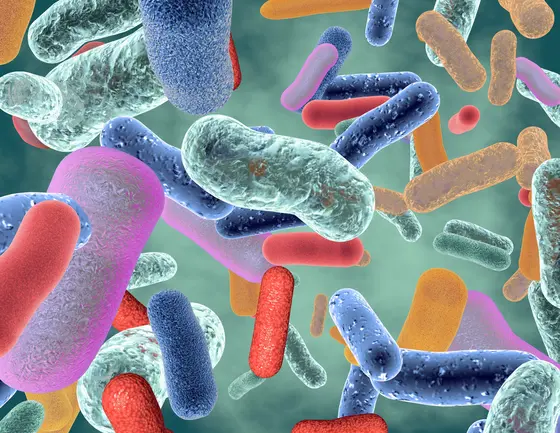Increasing evidence from human studies and preclinical experiments suggests that the gut microbiome may modulate the efficacy of T cell-driven cancer immunotherapies, such as immune checkpoint blockade. Immunotherapy with CD19 chimeric antigen receptor (CAR) T cell has opened up new treatment options for patients with certain forms of refractory and relapsing B-cell leukemias or lymphomas. But the therapy is hampered by considerable heterogeneity in responses. Complete and long-term remission is only achieved in up to 40% of patients.
Researchers from multiple centers in Germany and the United States, led by Eran Elinav, director of the DKFZ-Weizmann Institute of Science Microbiome & Cancer Bridging division, have found that the gut microbiome may modulate the efficacy of CD19 CAR T cell immunotherapy in patients with B cell leukemias and lymphomas.
This largest prospective study of its kind has followed 172 lymphoma patients previously failing multiple rounds of chemotherapy, from before CAR T immunotherapy initiation until two years later. Interestingly, 20% of patients receiving a subset of broad-spectrum (“high-risk“) antibiotics, such as meropenem, piperacillin–tazobactam or cefepime, featured an altered clinical response to subsequent CAR-T therapy, compared to patients who received other antibiotics and patients who were not treated with antibiotics prior to therapy.
However, this antibiotics-associated reduced CAR T therapy response was not driven by the effects of the antibiotics themselves, but rather by the fact that patients treated with “high-risk“ antibiotics before initiation of CAR T therapy tended to have higher pre-therapy tumor burden and systemic inflammation as compared to non-antibiotics-treated patients. These adverse pre-treatment conditions rendered subsequent CAR T therapy less effective.
Importantly, exclusion of these confounding “high-risk“ antibiotics-treated patients from the analysis enabled the researchers to identify strong and previously masked associations between the pre-CAR T therapy gut microbiome and subsequent clinical response to immunotherapy (including patients' survival). To further strenghen the connections between the starting microbiome and CAR-T efficacy across geography, diet, and and other confounders, the researchers next used machine learning models trained on the German cohort and then applied as a validation on the respective American patients. Importantly, the models were able to potently predict therapy outcomes, but only upon exclusion of patients exposed to “high-risk“ antibiotics. In other words, the study showed that the pre-therapy gut microbiome in lymphoma patients can help predict their response to subsequent CD19 CAR T therapy across populations, unless their microbiome is disrupted by wide-spectrum antibiotics.
The researchers identified several key microbiome features enabling the prediction of CAR-T efficacy, including species of Bacteroides, Ruminococcus, Eubacterium, and Akkermansia. Of these, Akkermansia was also associated with higher baseline peripheral T cell levels in these patients.
In all, the study reveals strong associations between microbiomes and CAR T outcomes, which first author Christoph Stein-Thoeringer (now professor at the University Medical Center Tübingen, Germany) believes may contribute to the development of microbiome-based predictions of CAR T cell immunotherapy outcomes. Additionally, findings from this study may enable to better understand the differential CAR-T cell activation, persistence, and clinical efficacy in different patients. The study also highlights the need for further investigation into the causal nature of the relationship between the gut microbiome and cancer immunotherapy outcomes.
“These exciting findings“, states Eran Elinav, “exemplify the potential of our unique microbiome signatures to be harnessed as possible markers of disease and treatment responsiveness in multiple human disorders, including cancer. With further research we hope that microbiome-based diagnostics and therapies will be incorporated into the precision oncology field“.
Christoph K. Stein-Thoeringer, Neeraj Y. Saini , Eli Zamir, Viktoria Blumenberg, Maria-Luisa Schubert, Uria Mor, Matthias A. Fante, Sabine Schmidt, Eiko Hayase, Tomo Hayase, Roman Rohrbach, Chia-Chi Chang, Lauren McDaniel, Ivonne Flores, Rogier Gaiser, Matthias Edinger, Daniel Wolff, Martin Heidenreich, Paolo Strati, Ranjit Nair, Dai Chihara, Luis E. Fayad, Sairah Ahmed, Swaminathan P. Iyer, Raphael E. Steiner, Preetesh Jain, Loretta J. Nastoupil, Jason Westin, Reetakshi Arora, Michael L. Wang , Joel Turner, Meghan Menges, Melanie Hidalgo-Vargas, Kayla Reid, Peter Dreger, Anita Schmitt, Carsten Müller-Tidow, Frederick L. Locke, Marco L. Davila, Richard E. Champlin, Christopher R. Flowers, Elizabeth J. Shpall, Hendrik Poeck, Sattva S. Neelapu, Michael Schmitt, Marion Subklewe, Michael D. Jain, Robert R. Jenq & Eran Elinav: A non-antibiotic-disrupted gut microbiome is associated with clinical responses to CD19-CAR-T cell cancer immunotherapy
Nature Medicine 2023, doi.org/10.1038/s41591-023-02234-6.
